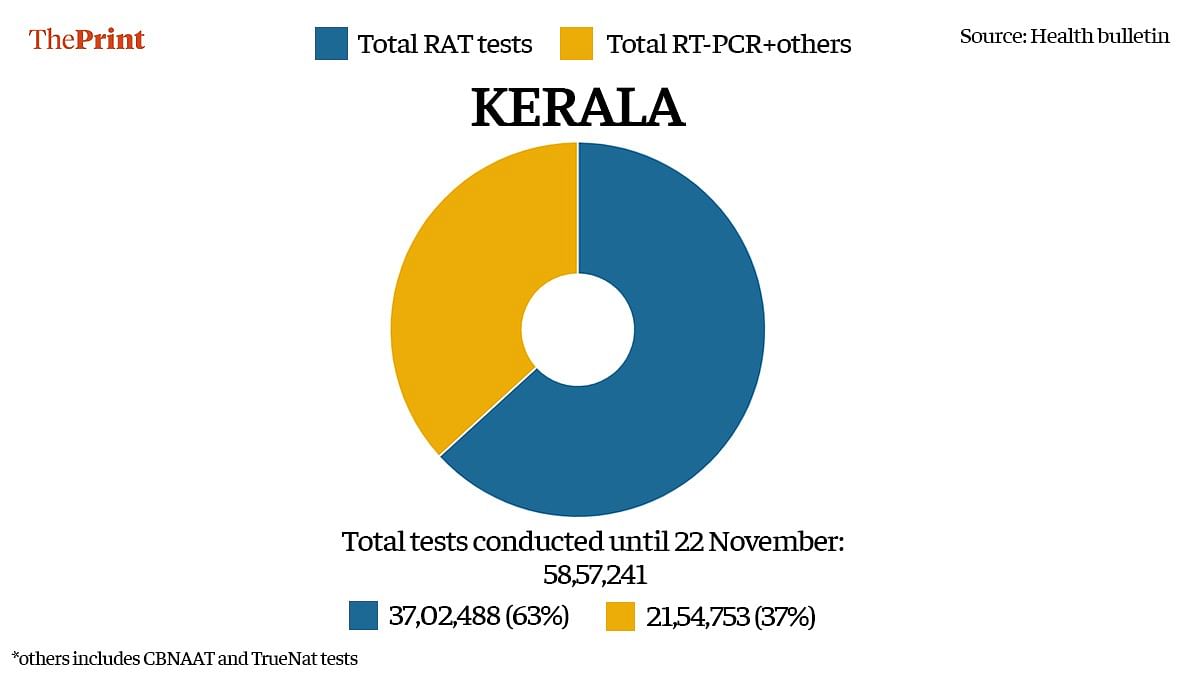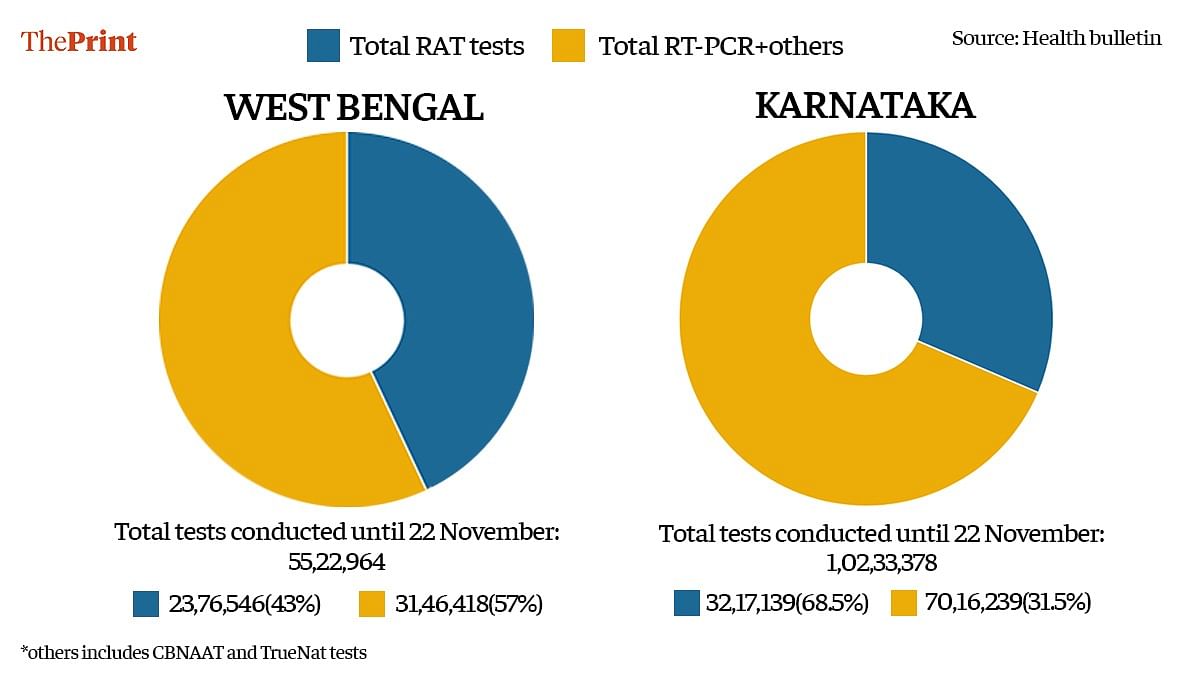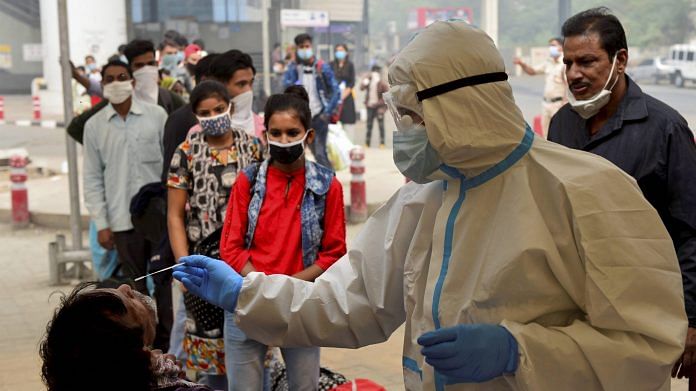New Delhi: Following a meeting with Home Minister Amit Shah last week, Delhi is due to double its RT-PCR testing amid a rising positivity rate and strong criticism that the city has been relying too heavily on the less accurate rapid antigen test (RAT).
But an analysis by ThePrint reveals that Delhi isn’t alone in this aspect of Covid testing — 88 per cent of tests conducted in Bihar are RATs, while this figure is 63 per cent for Kerala and 60 per cent for Uttar Pradesh.
In West Bengal and Maharashtra, over 40 per cent of tests conducted are RATs.
RATs are cheaper than the gold standard RT-PCR and can detect results in 30 minutes, but have a specificity of 99.3 to 100 per cent and sensitivity of 50.6 to 84 per cent. In other words, a positive result can be considered a true positive, but a negative result can be a false negative about 50 per cent of the time.
A high reliance on RATs can also have an effect on a state’s positivity rate, which is the fraction of positive cases of all tests performed, and indicates how well contained the disease is in a particular area. A high positivity suggests the disease is widespread and more tests need to be done to control it. Delhi’s positivity over the last week has averaged 12.2 per cent.
“From the point of view of controlling the disease, rapid tests can play an important part. But we should bear in mind that they are going to throw up quite a lot of false negatives, and this will affect the test positivity and could show it as lower than what it might actually be,” said Dr Murad Banaji, a mathematician with an interest in disease modelling.
Delhi has been repeatedly pulled up by the Delhi High Court and criticised by public health experts for conducting more RATs than RT-PCR tests. On 19 November, 64.6 per cent of the 62,437 tests conducted in the city were RATs. Delhi has conducted a total of 56,53,091 tests as of 19 November — the latest bulletin released by the government.
While the ICMR recommends using the RAT during routine surveillance in containment zones and requires symptomatic negative cases to be retested using the RT-PCR, it doesn’t set a limit or prohibit states from using the RAT outside of the recommended setting.
Even the Union health ministry revealed in a press conference on 10 November that nearly half of all tests conducted in the country — 49 per cent — were RATs.
Delhi may be on the hot seat for the moment, but it isn’t alone when it comes to RAT-dependence.
Also read: Slow testing, poor contact tracing led to surge in Covid cases, says parliamentary panel
How the states fare
Kerala, which reported India’s first few cases of Covid-19 in the last week of January and first week of February, and managed its spread efficiently, saw a rise in cases after Onam celebrations in August. It now accounts for the second highest number of active cases in the country.

As of 22 November, the state had a positivity 10.9 per cent. On the same day, a vast majority of the tests conducted — 76 per cent of 48,015 tests — were antigen tests. Since the pandemic began, antigen tests have accounted for 63 per cent of all tests done in the state.
In August, Kerala instituted a policy that limited the number of RT-PCR tests to be conducted. The policy states only patients with acute respiratory illness, those who have travelled within 14 days, and healthcare workers will be allowed the RT-PCR.
“I cannot comment on the state policy about using RATs, but we have ample and more capacity to conduct RT-PCR tests. We don’t do it at 100 per cent capacity if there is no reason to,” said Dr Amar Fetle, nodal officer for Covid in Kerala. “Our positivity rate has been coming down. We consider what test to do after an analysis of which panchayats and containment zones to focus on. A plan is made every evening.”
Low levels of infection in Bihar, Uttar Pradesh
Bihar and Uttar Pradesh have had surprisingly low levels of infection. The seven-day average positivity rate for Bihar is 0.5 per cent, while for UP it’s 1.7 per cent, according to calculations by Dr Rijo John, health economist and adjunct professor at Rajagiri College of Social Sciences in Kochi.
“In terms of absolute numbers, UP and Bihar contribute to 25 per cent of total tests conducted in India, while their caseload is low, putting them in good light and showing that they perform well on paper,” John told ThePrint. “But these states are not very transparent with data.”
Neither state reveals the number of RT-PCR and antigen tests in their health bulletins. In a recent press conference, Union Health Secretary Rajesh Bhushan revealed only 12 per cent of Bihar’s tests were RT-PCR, while a health official in the UP administration told ThePrint about 60 per cent of the tests conducted in the state were RATs.
Ragini Mishra, Bihar’s Covid nodal officer, defended the high number of RAT tests being done. “All the districts are overburdened (in terms of testing). They have been given targets for testing, they cannot show false figures,” she said. “Right now we have 10-12 RT PCR labs and we are capable of performing more than 10,000 tests which we are doing. So it is optimally utilised.”
Uttar Pradesh Director of Medical Services, D.S. Negi, told ThePrint, “We do about 60,000 RT-PCR tests and 90,000 are RATs. We can do more RT-PCR if we wish, but the ratio we are using now is serving us well and helping manage the spread and identity cases quickly.”
Also read: Covid patients shed viral RNA for upto 83 days but are infectious for about 9 — Lancet report
Other high burden states
Maharashtra, which is the highest burdened state with 17,80,208 cases as of 22 November, doesn’t reveal the number of antigen tests conducted, but state surveillance officer Pradeep Awate told ThePrint that of all tests conducted, approximately 45 per cent were RATs and 55 per cent RT-PCR. The state had conducted 1,02,13,026 tests until date.
Certain districts have reported over 70 per cent usage of RATs in overall testing.
“We’re testing more than the WHO’s standards of 140 tests per day per million, and are not relying on the RATs for screening,” Awate said. “After the Diwali festivities, we’re expecting a rise in cases.”

West Bengal also has a similar ratio, where 43 per cent of all 55,22,964 conducted have been antigen tests. The state has seen 4,52,770 positive cases of Covid.
In Karnataka, 68.5 per cent of tests have been a combination of RT-PCR and other tests such as the CBNAAT and TrueNat. The state has the second highest total cumulative cases in the country, at 8,73,046 as on 22 November.
Also read: Oxford Covid vaccine is safe, works better in older adults, study in Lancet says




Tamilnadu is the only state in india which doesn’t use Rapid Antigen Test so far. Till date tamilnadu has done more than 1.15 crore tests all of RT-PCR only.